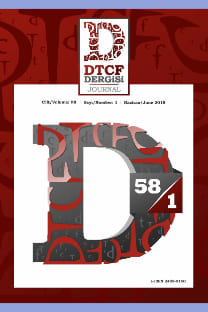KAYNAK BELLEĞİ: DERLEME ÇALIŞMASI
SOURCE MEMORY: A REVIEW
___
- Atkinson, Richard C. ve Richard M. Shiffrin. "Human memory: A proposed system and its control processes." Psychology of Learning and Motivation 2 (1968): 89- 195.
- Banks, William P. "Recognition and source memory as multivariate decision processes." Psychological Science 11.4 (2000): 267-273.
- Bayen, Ute J. ve Beatrice G. Kuhlmann. "Influences of source–item contingency and schematic knowledge on source monitoring: Tests of the probability-matching account." Journal of Memory and Language 64.1 (2011): 1-17.
- Bayen, Ute J., Kevin Murnane ve Edgar Erdfelder. "Source discrimination, item detection, and multinomial models of source monitoring." Journal of Experimental Psychology: Learning, Memory, and Cognition 22.1 (1996): 197- 215.
- Bodner, Glen E. ve D. Stephen Lindsay. "Remembering and knowing in context." Journal of Memory and Language 48.3 (2003): 563-580.
- Bröder, Arndt, Nelli Krüger ve Susanne Schütte. "The survival processing memory effect should generalise to source memory, but it doesn’t." Psychology 2.9 (2011): 896-901.
- Bröder, Arndt ve Thorsten Meiser. "Measuring source memory." Journal of Psychology 215.1 (2007): 52-60.
- Craik, Fergus I. M. ve Endel Tulving. "Depth of processing and the retention of words in episodic memory." Journal of Experimental Psychology: General 104.3 (1975): 268-294.
- Craik, Fergus I. M. ve Robert S. Lockhart. "Levels of processing: A framework for memory research." Journal of Verbal Learning and Verbal Behavior 11.6 (1972): 671-684.
- Crump, Matthew J. C., Zhiyu Gong ve Bruce Milliken. "The context-specific proportion congruent Stroop effect: Location as a contextual cue." Psychonomic Bulletin & Review 13.2 (2006): 316-321.
- Dodson, Chad S. metacognition: ve Daniel The L. Schacter. distinctiveness "When false heuristic." Journal recognition of Memory meets and Language 46.4 (2002): 782-803.
- Dodson, Chad S. ve Marcia K. Johnson. "Rate of false source attributions depends on how questions are asked." The American Journal of Psychology (1993): 541- 557.
- Ferguson, Susan A., Shahin Hashtroudi ve Marcia K. Johnson. "Age differences in using source-relevant cues." Psychology and Aging 7.3 (1992): 443-452.
- Frost, Peter ve diğerleri. "The influence of confirmation bias on memory and source monitoring." The Journal of General Psychology 142.4 (2015): 238-252.
- Mısırlısoy, Mine ve Nart Bedin Atalay. "Survival processing enhances source memory: Evidence from a within-subjects comparison." 53rd Annual Meeting of the Psychonomic Society, Minneapolis, MN. 2012.
- Mısırlısoy, Mine ve Suzan Ceylan. "Olay sonrası yanlış bilgi paradigması: Yaşlanma ve stresin etkisi." Türk Psikoloji Yazıları 17.33 (2014): 60-73.
- Mısırlısoy, Mine, Suzan Ceylan ve Nart Bedin Atalay. "Hayatta kalma bağlamının bellek yanılmaları üzerindeki etkisi." DTCF Dergisi 56.2 (2016): 214-237.
- Mulligan, Neil W., Miri Besken ve Daniel Peterson. "Remember-know and source memory instructions can qualitatively change old-new recognition accuracy: The modality-match effect in recognition memory." Journal of Experimental Psychology: Learning, Memory, and Cognition 36.2 (2010): 558-566.
- Murnane, Kevin ve Ute J. Bayen. "An evaluation of empirical measures of source identification." Memory & Cognition 24.4 (1996): 417-428.
- Nairne, James S., Sarah R. Thompson ve Josefa N. S. Pandeirada. "Adaptive memory: Survival processing enhances retention." Journal of Experimental Psychology: Learning, Memory, and Cognition 33.2 (2007): 263-273.
- Nairne, James S. ve diğerleri. "Adaptive memory: Does survival processing enhance memory for source." 51st Annual Meeting of the Psychonomic Society, St. Louis, MO. 2010.
- Nairne, James S. ve diğerleri. "Adaptive memory: Enhanced location memory after survival processing." Journal of Experimental Psychology: Learning, Memory, and Cognition 38.2 (2012): 495-501.
- Schacter, Daniel L. "The seven sins of memory: Insights from psychology and cognitive neuroscience." American Psychologist 54.3 (1999): 182-203.
- Toglia, Michael P. "Recall accuracy and illusory memories: When more is less." Memory 7.2 (1999): 233-256.
- Whittlesea, Bruce W. A. ve Lisa D. Williams. "Why do strangers feel familiar, but friends don't? A discrepancy-attribution account of feelings of familiarity." Acta Psychologica 98.2-3 (1998): 141-165.
- ISSN: 0378-2905
- Yayın Aralığı: 2
- Başlangıç: 1942
- Yayıncı: Ankara Üniversitesi Dil ve Tarih-Coğrafya Fakültesi
MODERN TEODİSE DENEMELERİNİN OLANAĞI ÜZERİNE
SERGEY DOVLATOV'UN ESERLERİ ÇERÇEVESİNDE RUSÇADA ÖRTMECELER
BABA-OĞUL-OTORİTE ÜÇGENİNDE “KIRMIZI SAÇLI KADIN” VE “TRANS-ATLANTİK”
TURNING LANGUAGE INSIDE OUT IN BECKETT'S NOT I
JAMES J. GIBSON'IN GÖRSEL ALGI KURAMININ BEDENLENMİŞ BİLİŞ KAVRAMI BAĞLAMINDA BİR TARTIŞMASI
İSTANBUL ÖĞRETMENLERİNİN BURSA SEYAHATİ VE MUSTAFA KEMAL PAŞA'NIN BAŞÖĞRETMENLİĞE GEÇİŞ KONUŞMASI
AN EXPERIMENTAL META-TRAVEL TO “THE HEADQUARTER OF THE ABSOLUTE”: THE INDIA OF GIORGIO MANGANELLI
RUS DİLİNDE ZAMAN ANLAMLARININ OLUŞUMUNDA GÖRÜNÜŞ KATEGORİSİNİN ETKİSİ
